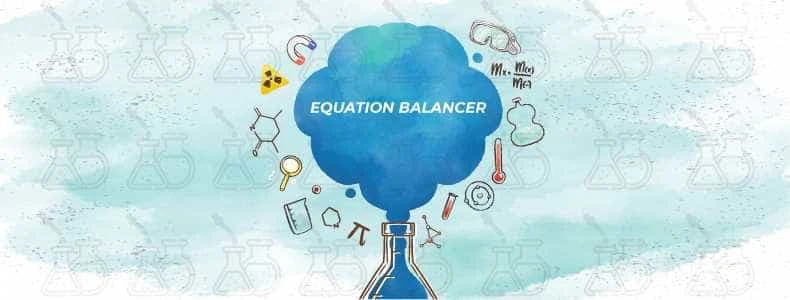In chemistry, we deal with chemical equations because they help us determine the identity of substances that are being reacted with (reactants) and the substances that are being formed by their reactions (products).
It is surprising that we can predict the product of the following reaction only by seeing the LHS of the equation. For this, we have to remember some key points. A chemical equation balancer helps you complete the process digitally.
How to predict the product of the following reaction?
For predicting the nature of a substance during a chemical reaction, we need to look at the nature of the reacting species and the chemical reaction types.

-
The chemical reaction between metals and halogens results in the formation of salt. An example is the formation of NaCl, such as
2Na (metal) + Cl2 (halogen) → 2NaCl (salt)
-
The chemical reaction between acid and base results in the formation of salt and water. It happens due to neutralization reaction such as
HCl + NaOH → NaCL + H2O
-
In synthesis reactions, the final product is the combination of reactants involved in the chemical reaction, such as follows:
Also, learn what is synthesis in chemistry to understand synthesis completely.
2Al + 3Cl2 → 2AlCl3
-
In simple displacement reactions, one part of a compounds gets replaced by the other part, as follows:
PbCl4 + 2F2 → PbF4 + 2Cl2
-
For predicting the product of a reaction, the equation balancer is available on the internet. While you enter the reactants, a complete equation will be displayed in a few seconds. The chemical equation product calculator works faster and is the best alternative to manual calculations.
Chemical equations identify substances and determine the quantity (the number of atoms of each element) of each substance involved in the reaction. This makes the balancing chemical equation calculator very significant to use.
To determine quantity correctly, chemical equations must be completely balanced. The balancing equation calculator allows this without errors. Before we move on to the methods of balancing chemical equations, let's recall the definitions of balanced and unbalanced chemical equations.
Related: Learn what are gas laws and how many gas laws are there.
What is an unbalanced equation?
An unbalanced chemical equation has an unequal number of atoms on both sides of the equation. Let's consider a general reaction for illustrating equation balancing
2A + 2B → AB
The above equation in the reaction mixture has two atoms of A and two atoms of B. Both atoms react and form the product AB, which contains only one atom of A and one atom of B.
As per the law of mass conservation, it is not possible, so the given equation is unbalanced. The balance chemical equations calculator highlights to the user if the equation is unbalanced. Let's consider a chemical equation this time.
Na2+Cl2 → NaCl (unbalanced equation)
The example has two atoms of sodium and two atoms of chlorine at L.H.S. Atoms of sodium and one atom of chlorine are on R.H.S., making the equation unbalanced. You can find the atomic weight of substances using the molecular weight calculator on this website to calculate molar mass, atomic mass, and molecular weight.
Use an atomic mass calculator to calculate count, atom, molecular mass, subtotal mass, and atomic mass accurately.
While we are studying chemical reactions in chemistry, there are unbalanced chemical equations that need to be balanced. Not balancing such equations may result in ruining the entire research work due to wrong observations. Therefore, it is necessary to learn how an equation balancer works and what are the steps for balancing chemical equations using a calculator.
What is chemical equation balancing?
A balanced chemical equation possesses an equal number of atoms on both sides of the equation. Such as
2A + 2B → 2AB
It can be seen that there are two atoms of A and two atoms of B, which, on reacting with each other, change into two molecules of AB (2AB:2A1=2•1=2 atoms, 2B1=2•1=2) Now, let us consider a chemical equation to clear the concerns
Na2 + Cl2 → 2NaCl
Just as general equation, there are two atoms of sodium (1 Na2 = 1•2 = 2) and two atoms of chlorine (1 Cl2 = 1•2 = 2) which reacts with each other to form 2 molecules of NaCl (2 NaCl:2Na = 2•1 = 2, 2 C1 = 2•1=2)
It is proven with the examples that the process of balancing chemical equations requires an equal number of atoms of reactants and products. This will help you understand what happens when sodium and chlorine react with each other. This also signifies the use of a balanced equation calculator.
Related: Also, learn how to balance complex equations in detail.
How to balance chemical equations?
Balancing complex equations has many ways, but each method is specific to a specific type of reaction. The inspection method is commonly used to balance chemical equations. In this method, you have to count the number of atoms of each element on both sides of the equation.
This method is used to balance the number of atoms on each side of equations, and another method includes the use of a chemistry equation balancer.
We can determine the number of atoms by multiplying the subscript value of each element present in the compound with the coefficient value, such as
AB4 + 2C2 → AC + BC (unbalanced)
We need to determine the number of atoms taking part in the reaction to balance this equation.
1A1 = 1•1 = one atom of A
1B4 = 1•4 = four atoms of B
2C2 = 2•2 = four atoms of C
- Since there is only one atom of A at L.H.S., there is no need to add any coefficient or subscript value to A at R.H.S.
- Since there are four atoms of B and four atoms of C, the product BC would be converted to 2B2C. We cannot write the product as 2B2C2 because it would show the four atoms of B and five atoms of C since there is another atom of C present in product AC (2B2C2+AC=4+1=5 unbalanced). Find this blog useful for learning more about what is a conversion factor in chemistry.
- To balance the value of C, change the subscript value of C in AC as AC2
Thus, the final equation would be such as
AB4 + 2C2 → AC2 + 2B2C (balanced)
Related: Percent composition calculator helps you calculate the percentage of each element in a compound.
You just have to write the unbalanced equations, and in a few seconds, it will balance the equations for you. The balancing equations calculator usually makes your work error-free.
We must not depend on the equation balancer completely because we can't use this tool in the examination hall.
The chemical equation product calculator and the limiting reactant calculator widely used by many people. The methods of these balance equation calculator are almost the same; however, the final equation is shown with the exact value of the coefficient and subscript.
So you can predict the limiting reactant easily by seeing the equation. Due to this reason, such a balance chemical equation calculator is more preferred by the researchers.
How to balance equation?
HNO3 + Ca(OH)2 → Ca(NO3)2 +H2O
First of all, compare the total number of atoms of each element taking part in the chemical reaction.
-
Since there are two N atoms on the product side, multiply HNO3 with 2. The equation would become
2HNO3 + Ca(OH)2 → Ca(NO3)2 + H2O (unbalanced)
-
Since the reactant side contains four atoms of hydrogen, balance the number of atoms at the product side by multiplying H2O by 2. The equation would become
2HNO3 + Ca(OH)2 → Ca(NO3)2 + 2H2O (unbalanced)
Since both sides contain equal numbers of atoms now, the given equation is balanced.

Can you balance the equation with the fraction?
While balancing the number of atoms in an unbalanced chemical equation, you might be subjected to cases where you have to use a fractional coefficient other than a whole number coefficient.
This is being done in cases when there is no way to balance chemical equations completely as it also work on the functionality of equation balancer. Moreover, this fractional value is being used temporarily and never mentioned in the final equation.
To clarify the point, let us consider an example
C4H10 → H2O + CO2(unbalanced)
First, we have to balance the number of atoms on both sides - starting with the hydrogen atom.
Since there are ten atoms of hydrogen at L.H.S, there would be five molecules of H2O. Moreover, since there are four atoms of Carbon at L.H.S, there would be four molecules of CO2
The final equation would be written such as
C4H10 + O2 → 5H2O + 4CO2(unbalanced)
Since there are a total of 13 atoms of oxygen at R.H.S, there is not any whole number coefficient that could be multiplied by the subscript 2 to form 13, so we wrote the coefficient in fraction 13/2 such as follows
C4H10 + 13/2 O2 → 5H2O + 4CO2(balanced)
It is a rule that the final equation cannot be written in fractional coefficient, thus, to solve this fractional quantity, we multiply the entire equation with 2 to convert the fraction into the whole number which results in the final equation such as
2C4H10 + 13O2 → 10H2O + 8CO2(unbalanced)
Since putting the fractional quantity in the equation is an intermediate step, whenever you would use an online equation solver, this intermediate step would not be shown there. The balancing chemical equations calculator highlights you whether your equation is balanced or not.
Also find titration calculator to calculate molarity of the acid & volume of the acid.
How to balance the equation by oxidation number method?
This method is mainly being used for balancing redox reactions in acid on the basis of oxidation numbers. The method is as follows
-
Write the complete equation and oxidation states of each element of reactants and product
Learn the complete method for determining oxidation states to understand better.
+1*2K2 +6*2Cr2-2*7O7 + -1H-1CL
→
+3Cr-1*3Cl3 + -1K-1Cl + +1*2H2-2O -
Now consider the atoms which do not undergo any kind of change in their oxidation numbers. From the above equation, it can be seen that the oxidation state of Cl in +1H-1Cl at reactant side is -1 which changes into zero in the product side 0Cl2.
However in +1K-1Cl, the oxidation state of Cl is again being mentioned as -1. It predicts that there are two types of Cl molecules present in the reactant mixture - one which undergo change in oxidation states and other which do not undergo change in their oxidation state.
Thus, we can write equation such as
+1*2K2 +6*2Cr2-2*7O7 + -1H-1CL + HCL
→
+3Cr-1*3Cl3 + 0Cl2 + -1K-1Cl + +1*2H2-2O-
Since there are two atoms of Cr at reactant side which possess oxidation state of +6 (+1×2K2+6×2Cr2-2×7O7). After the reaction, the oxidation state of Cr changes to +3 in +3Cr-1×3Cl3.
Thus to balance equation, multiply CrCl3 with 2 which result in equation as follows
+1*2K2 +6*2Cr2-2*7O7 + -1H-1CL + HCL
→
2+3Cr-1*3Cl3 + 0Cl2 + -1K-1Cl + +1*2H2-2O
-
-
The above equation predicts that there should be 6 HCl atoms at L.H.S which undergo change in oxidation state by losing six electrons and obtain an oxidation state of zero in 0Cl2. Try using chemistry equation balancer for online solution. To balance this, multiply HCl by six such as
+1*2K2 +6*2Cr2-2*7O7 + 6-1H-1CL + HCL
→
2+3Cr-1*3Cl3 + 0Cl2 + -1K-1Cl + +1*2H2-2O -
Since there are two atoms of potassium at reactant side +1×2K2 +6×2Cr2-2×7O7 , multiple KCl with 2 to balance number of K at both sides of equation such as
+1*2K2 +6*2Cr2-2*7O7 + 6-1H-1CL + HCL
→
2+3Cr-1*3Cl3 + 0Cl2 + 2-1K-1Cl + +1*2H2-2O -
To count the total number of oxidized Cl atoms at the reactant side, sum up the total number of Cl in 2KCl and 2CrCl3 which are equal to eight. Thus, put this figure in equation such as
+1*2K2 +6*2Cr2-2*7O7 + 6-1H-1CL + 6HCL
→
2+3Cr-1*3Cl3 + 0Cl2 + 2-1K-1Cl + +1*2H2-2O -
Since the reactant side contains seven oxygen atoms, multiply H2O with seven.
+1*2K2 +6*2Cr2-2*7O7 + 6-1H-1CL + 6HCL
→
2+3Cr-1*3Cl3 + 0Cl2 + 2-1K-1Cl + 7+1*2H2-2O -
Finally, simplify the equation by removing the oxidation states and summing up the total unoxidized and oxidized Cl molecules such as
K2Cr2O7 + 12HCl
→
2CrCl3 + Cl2 +2KCl + 7H2O
The balancing chemical equations calculator becomes the best option which ensures the correctness of the final equation. For specifically calculating the oxidation number using online tools, we provide you oxidation number calculator to get the job done easily with few clicks.
How to balance chemical equation by ion-electron method
This method is also being used to balance redox equations which possess ions and an aqueous medium. The basic principle is to eliminate those ions which do not undergo a change in oxidation states by giving or gaining valence electrons. The chemical equation balancer includes this functionality as well.
We consider only those which show the change in oxidation states either by giving or gaining electrons in the valence shell. Therefore, the method is being called the ion-electron method. To understand the method, let us discuss the redox reaction between HCl and KMnO4 in which Cl and MnO4 change oxidation state such as
Cl- + MnO4- → Cl20 + Mn2+
-
In this reaction, Cl is oxidized by losing electrons while MnO4 is reduced by gaining these electrons. So, we can divide the equation into two parts (oxidizing part and reducing part).
Oxidizing part :
Cl- → Cl20
Reducing part :
MnO4- → Mn2+
-
Since there are two atoms of Cl on the product side, the oxidation equation would become
2Cl- → Cl20
-
Since the reaction is taking place in an acidic medium, add H+ at L.H.S and balance these H+ ions by adding H2O at R.H.S such as
8H+ + MnO4- → Mn2+ + 4H2O
-
Add the number of electron lost and gained by each part such as
2Cl- → Cl20 + -2e
8H+ + MnO4- + 5e → Mn2+ + 4H2O
-
To balance the number of electrons lost and gained in both parts, multiply both parts with a specific coefficient to get the final equation. Since the reduction part is getting 5e, multiply oxidation part with 5 and since oxidation part is losing 2 electrons, multiply reduction part with 2.
(2Cl- → Cl20 + -2e)*5
(8H+ + MnO4- + 5e → Mn2+ + 4H2O) * 2
-
The final equation would be obtained by summing up both parts.
10Cl- + 16H + 2MnO4- → 5Cl2 + 2Mn2+ + 8H2O
Related: Theoretical yield calculator can help you finding the reaction yield of a chemical reaction.
The same method is being used for a reaction occurring in basic media. However, you have to add OH ions to balance both sides other than H+ ions. For further convenience, the online way of doing it using chemical equation product calculator is also helpful.
How to balance equation in the basic medium?
Let us consider a redox reaction taking place in a basic medium such as follows
H2O + MnO4-1 + C2O4-2 → MnO2 + CO2 + OH-1
-
Since
MnO4-1
and
C2O4-2
are showing changes in oxidation state, we would consider only them.
-
Since
C2O4-2
is being oxidized by giving electrons, it would constitute the oxidation part. Moreover, since
MnO4-1
is getting reduced by gaining electrons, it would constitute a reduction part.
-
We will change the oxidation part for balancing the number of C atoms on both sides
C2O4-2 → 2CO2
-
To balance the reduction part, add two H2O molecules on the reactant side and balance it on the product side by adding four OH ions such as
MnO4-1 + 2H2O → MnO + 4OH-
-
Add the number of electrons gained and lose in both parts such as
C2 O-24 → 2CO2 + -2e
MnO4-1 + 2H2O + 3e → MnO + 4OH-
-
Balance the number of electrons at both sides by multiplying the reduction part with 2 and the oxidation part with 3. Then add both parts to get the final equation such as
2MnO4-1 + 3C2O4-2 +4H2O → 2MnO + 6CO2 + 8OH-
To get accurate and fast results, you can use an advanced balancing chemical equation calculator to balance chemical equations. You can use redox reaction calculator on this website for balancing redox equations and reactions.
How to use Equation Balancer?
This balance chemical equations calculator helps to balance chemical equations quickly. If you are using balancing chemical equations calculator with steps, you'll know how easy it is to operate.
There are many sample equations in this chemical equation balance calculator so that you can practice and balance equations. Also there is a chemistry periodic table under the chemical equation balancer calculator so that you can add values from there. You can also learn all about periodic table equations to understand better.
Once you entered your equation in the field, the balancing equations calculator will balance your equation immediately. Share this with your class mates & others so that they could also get benefit from it.












 Google Play
Google Play
0 Comment